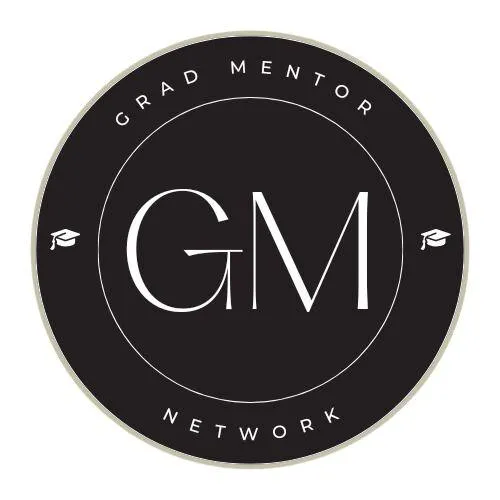

Welcome to the Grad Mentor Network
Unlock Your Academic Potential with Our Exclusive Membership Plans

WHO WE ARE
Unlock Success with Tailored Academic Support
At Grad Mentor Network, led by Dr. Robinson and showcased on renowned platforms such as "Dissertation in 90 Days" and "Club 3E," we offer a comprehensive support system for graduate and doctoral students. Leveraging the expertise of WritersER, which helps master's and PhD candidates achieve approval in six months or less, and our Grad Bootcamps, designed to help students navigate the complexities of academia through bootcamps, our programs are meticulously crafted to support you through every stage of your academic journey. Subscribe today and unlock access to an extensive array of resources, expert guidance, and a supportive community tailored specifically to your academic needs.


Mentoring
Personalized guidance from experts, including Dr. Robinson, to help members navigate their academic journey effectively.

Resources
Access to a comprehensive library of study guides, templates, and specialized training materials tailored for graduate and doctoral studies.

Community
Connection to a private online network where members can interact, share experiences, and support each other through their academic challenges.
Tier 1:
Essential Support - $19/month
Podcasts
Tune in to five weekly podcast episodes packed with strategies for dissertation success, effective time management, research methodologies, and tackling graduate challenges.
Community Access
Join our exclusive online community to connect with peers, share your journey, and find support from fellow students.
Newsletters
Receive five weekly newsletters filled with actionable advice, insightful tips, and motivational content designed specifically for graduate and doctoral students.
Live Q&A Sessions
Engage in our monthly live Q&A sessions with Dr. Robinson and other field experts, designed to answer your burning questions and provide personalized guidance.
Tier 2:
Advanced Support - $49/month
(Includes Tier 1)
GradCoach.io App Access Coming Soon
Get tailored training covering everything from proposal writing to thesis defense, exclusively designed for PhD and Master's students.
Weekly Live Training
Participate in live interactive sessions that delve into essential aspects of the academic journey, offering real-time feedback and personalized advice.
Resource Library
Study guides, templates, and essential research tools sent to your email.
Exclusive Discounts
Enjoy special discounts on Grad Mentor Network-branded merchandise and academic tools.
Digital Calendar
Start each month with a new, beautifully designed digital calendar wallpaper.
Tier 3:
Premium Support - $79/month
(Includes Tiers 1 and 2)
Dissertation Tools
Access downloadable exercises and worksheets tailored for each phase of your dissertation, keeping you organized and on track.
Monthly Digital Product
Receive a new digital product each month, such as e-books, specialized training videos, or unique templates.
Monthly Mastermind Sessions
Join small group mastermind sessions that focus on specific academic challenges, offering tailored solutions and peer support
One-on-One Mentoring
Benefit from two personal mentoring sessions per month, providing you with expert guidance tailored to your individual needs.
Priority Support and Exclusive Content
Enjoy priority email support and behind-the-scenes looks at training sessions and upcoming projects.
Personalized Editing Support (10 Pages per month)
Receive tailored editing assistance for up to 10 pages each month, ensuring your content is polished and professionally refined to meet your specific needs.
Tier 4:
Exclusive Support - $99/month
(Includes Tiers 1, 2, and 3)
Recognition and Thanks
Be acknowledged by name in all new podcast episodes and video descriptions.
Specialized Webinars
Gain access to exclusive webinars discussing advanced topics like grant writing and career planning in academia.
Personalized Feedback
Receive detailed feedback on your dissertation chapters or research papers from Dr. Robinson or a senior mentor.
Networking Opportunities
Get invitations to virtual networking events with alumni and professionals across various academic fields.
Unique Merchandise
Claim exclusive Grad Mentor Network merchandise not available to other tiers.
Personalized Editing Support (15 Pages per month)
Get customized editing support for up to 15 pages monthly, enhancing clarity, style, and accuracy according to your unique requirements.
Tier 5:
Ultimate Support - $109/month
(Includes Tiers 1, 2, 3, and 4)
Social Media Recognition
Receive a monthly shoutout by name on our social media platforms and YouTube community tab.
On-Screen Credits
Enjoy on-screen recognition as a co-sponsor in every episode of our podcasts and training videos.
VIP Access
Get exclusive tickets to VIP events and workshops, designed to elevate your academic and professional connections.
Advanced Mastermind Sessions
Engage in weekly advanced mastermind sessions with high-achieving peers and field experts.
Exclusive Content Feed
Dive into an exclusive content feed filled with behind-the-scenes updates, additional resources, and more.
Free Books
Enjoy a free book every month from the Doctoral Chronicles Series or authored by Dr. Robinson, up to 12 books a year.
Resources

Coaching and Editing Support for your Dissertation

Books, Newsletters and Podcasts

Bootcamps

TAKING A FRESH LOOK
Membership Tiers
Tier 1
1 Month Essential Support
$19
Weekly Podcasts
Motivational Newsletters
Private Community
Monthly Q&A
Tier 2
1 Month Advanced Support
$49
Tier 1
App Access
Live Training
Resource Library
Merchandise Discounts
Tier 3
1 Month Premium Support
$79
Tier 1 & 2
Dissertation Tools
Digital Products
Bi-Weekly Mastermind
One-on-One Mentoring
Tier 4
1 Month Exclusive Support
$99
Tier 1, 2 & 3
Name Recognition
Specialized Webinars
Personalized Feedback
Networking Events
Tier 5
1 Month Ultimate Support
$109
Tier 1, 2, 3 & 4
Social Media Shoutout
On-Screen Credits
VIP Event Access
Advanced Mastermind
Resource Milestones
Expansive Collection of Guides, Templates, and Training Materials

5,000+
Downloads Achieved

1,200+
Resources Created

Recent Blogs

Decoding the PhD Advisory Relationship: Tips for Building a Supportive Mentorship
Decoding the PhD Advisory Relationship: Tips for Building a Supportive Mentorship
Introduction
Starting a PhD journey is a monumental task, filled with challenges and opportunities for growth. One of the most critical elements in this journey is the advisory relationship between the PhD student and their mentor. This relationship can significantly impact the trajectory of a student's academic career, influencing everything from research direction to career prospects. This post will decode the intricacies of the PhD advisory relationship, providing actionable tips to foster a supportive mentorship that enhances both personal and professional development.

The Importance of a Strong PhD Advisory Relationship
Understanding the Advisor's Role
The advisor plays a pivotal role in guiding PhD students through their research and academic development. They offer expertise, feedback, and support, helping students navigate the complexities of their dissertation. However, the advisor's role goes beyond academic guidance. They can also be a source of professional advice, networking opportunities, and emotional support. A strong advisory relationship can provide a solid foundation for a successful PhD journey.
Building Mutual Respect and Communication
Effective communication is the cornerstone of any successful advisory relationship. Establishing mutual respect and open lines of communication from the outset can prevent misunderstandings and foster a collaborative environment. Regular meetings, clear expectations, and honest feedback are essential components of this dynamic. Students should feel comfortable discussing their ideas, challenges, and progress, while advisors should be approachable and supportive.
Tips for Building a Supportive Mentorship
Selecting the Right Advisor
Choosing the right advisor is one of the most crucial decisions in a PhD program. Consider the following factors when making your choice:
Research Interests and Expertise: Ensure your advisor's research interests align with yours. Their expertise should complement your research goals, providing valuable insights and guidance.
Advisory Style: Different advisors have different mentoring styles. Some may be hands-on, providing detailed guidance, while others may take a more hands-off approach, encouraging independence. Understand your own needs and preferences to find a compatible match.
Reputation and Network: An advisor with a strong reputation in your field and a broad professional network can open doors for collaborations, conferences, and job opportunities.
Setting Clear Expectations
From the beginning of the advisory relationship, it is vital to set clear expectations regarding communication, feedback, and progress. Discuss and agree upon:
Meeting Frequency: Determine how often you will meet and what will be discussed in these meetings. Regular check-ins can help keep you on track and address any issues promptly.
Feedback Process: Establish how and when feedback will be provided. Timely and constructive feedback is crucial for your development and progress.
Responsibilities and Boundaries: Clearly define each party's responsibilities and boundaries to avoid misunderstandings and ensure a productive working relationship.
Developing Effective Communication Skills
Communication is a two-way street, and developing effective communication skills is essential for a successful advisory relationship. Consider the following tips:
Active Listening: Pay attention to your advisor's feedback and suggestions. Show that you value their input by asking questions and seeking clarification when needed.
Be Proactive: Take initiative in your research and communication. Keep your advisor informed of your progress and any challenges you encounter. Being proactive demonstrates your commitment and independence.
Seek Feedback: Regularly seek feedback on your work and progress. Constructive criticism can help you improve and stay on track.
Navigating Challenges in the Advisory Relationship
Managing Conflicts
Conflicts and disagreements are inevitable in any relationship, including the PhD advisory relationship. How you handle these conflicts can determine the success of your mentorship. Here are some strategies for managing conflicts effectively:
Address Issues Early: Do not let small issues escalate into major conflicts. Address concerns and disagreements early on through open and respectful communication.
Seek Mediation: If you cannot resolve a conflict directly with your advisor, consider seeking mediation from a third party, such as another faculty member or a university ombudsman.
Focus on Solutions: When discussing conflicts, focus on finding solutions rather than assigning blame. Collaborative problem-solving can strengthen the advisory relationship and lead to positive outcomes.
Balancing Independence and Guidance
Finding the right balance between independence and guidance can be challenging in a PhD advisory relationship. Here are some tips to help you navigate this balance:
Understand Expectations: Clarify your advisor's expectations regarding independence and guidance. Understand when and how they expect you to seek their input and when they expect you to work independently.
Take Ownership: Take ownership of your research and progress. Show initiative and take responsibility for your work, while also being open to your advisor's guidance and feedback.
Communicate Needs: Communicate your needs and preferences regarding independence and guidance. If you feel you need more support or guidance, do not hesitate to discuss this with your advisor.
Building a Network of Support
Leveraging Other Mentors and Resources
While your primary advisor plays a crucial role in your PhD journey, it is also important to build a broader network of support. Consider the following strategies:
Seek Additional Mentors: Identify other faculty members, researchers, or professionals who can provide additional guidance and support. These mentors can offer different perspectives and expertise.
Utilize University Resources: Take advantage of university resources such as writing centers, career services, and counseling services. These resources can provide valuable support throughout your PhD journey.
Join Professional Organizations: Joining professional organizations and attending conferences can help you build a network of peers and mentors in your field.
Fostering Peer Support
Peer support is an invaluable resource during your PhD journey. Building a network of supportive peers can provide emotional support, motivation, and collaborative opportunities. Consider the following tips:
Form Study Groups: Form study groups with fellow PhD students to discuss research, share resources, and provide mutual support.
Participate in Peer Mentoring Programs: Many universities offer peer mentoring programs where more experienced students mentor newer students. Participating in these programs can provide additional support and guidance.
Engage in Social Activities: Engage in social activities and events organized by your department or university. Building relationships with your peers can provide a sense of community and belonging.
Additionally, here's a related Podcast on YouTube. It could provide you a multi-faceted understanding of the topic.
Conclusion
The PhD advisory relationship is a cornerstone of a successful doctoral journey. By selecting the right advisor, setting clear expectations, developing effective communication skills, and building a network of support, you can foster a supportive mentorship that enhances your personal and professional development. Remember, a strong advisory relationship is built on mutual respect, open communication, and a shared commitment to success.
If you are ready to take the next step in your academic journey and need support, schedule an admission interview with WritersER. Our expert team helps master's, PhD, and doctoral candidates finish their next academic milestone in 6 months or less. Click here to get started!
Begin Your Journey Today!
Embark on a transformative academic journey with Grad Mentor Network. Choose the membership tier that best suits your needs and become part of a network dedicated to your success. Subscribe now and take the first step towards unlocking your potential in the academic world.
